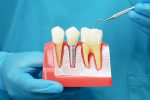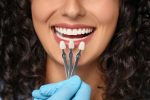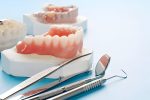Gum disease can start slowly and worsen over time. If you have noticed bleeding gums, bad breath, or loose teeth, it is time to consider visiting a dentist for treatment.Getting periodontal treatment in Airdrie early can help save your gums and teeth.In this guide, you will learn what to look for in terms of gum disease, how to identify it early, and what treatment options are available.
What Is Periodontal Disease?
Periodontal disease (gum disease) is an infection of the gums and bones that support your teeth. The disease begins with plaque buildup and, if neglected, can result in irreversible damage.
There are two main forms of periodontal disease:
- Gingivitis – The early stage where the gums become red and swollen and may bleed.
- Periodontitis – The advanced stage where the gums pull away from the teeth, bone loss occurs, and teeth may loosen or be lost.
In order to prevent gum disease and save your teeth, it is important to have the condition identified early so treatment can begin.
Signs That You Need Periodontal Treatment
Recognizing the signs you need periodontal treatment will help you obtain care before things get worse.
The following early warning signs are commonly linked to periodontal disease:
- When brushing or flossing, gums that bleed
- A persistently foul breath
- Gums that are red, swollen, or sensitive
- Gums that recede or teeth that appear longer
Make sure to speak with your dentist right away if you experience any of the symptoms listed above.
How to Detect Gum Disease Early
Learning how to detect gum disease early is key to preventing damage. Here’s what you can do:
- Visit your dentist regularly for cleanings and checkups
- Pay attention to any changes in your gums or breath
- Use a toothbrush with soft bristles, and do not forget to floss daily
- Avoid tobacco and eat a balanced diet
The earlier gum disease is found, the easier it is to treat.
Why You Should See a Dentist
Seeing a dentist in Airdrie who understands gum care can help protect your health. Local dentists are trained to catch signs of gum disease and provide the right treatment.
Benefits of local care:
- Easy access for follow-up visits
- Personalized treatment plans
- Comfortable and familiar environment
- Ongoing support for home care routines
How To Find the Right Dentist
Finding a dentist near you means you don’t have to wait to start treatment. Gum disease can spread quickly, so it’s important to act early.
Look for these qualities in a nearby dental provider:
- Experience in treating gum disease
- Clear communication and gentle care
- Updated tools and modern techniques
Your dentist can help stop gum disease and prevent future problems.
Periodontal Treatment Options
| Treatment Type | What It Does | Best For |
| Deep Cleaning (Scaling & Root Planing) | Removes plaque below the gum line | Early to moderate gum disease |
| Antibiotics | Fights infection | Swollen or infected gums |
| Flap Surgery | Lifts gums to clean roots | Advanced gum disease |
| Bone Grafting | Rebuilds lost bone support | Severe bone loss |
Don’t Wait to Treat Your Gums
Gum disease often starts small but can lead to serious problems if ignored. Red or swollen gums, bleeding, and bad breath are not normal signs. The good news? With early care, gum disease is treatable.
At Airdrie Family Dentists, we offer advanced care to help stop gum disease in its tracks. If you’re noticing signs or want to get ahead of future problems, schedule a consultation today.
What Patients Ask About Periodontal Treatment?
- Is gum disease reversible?
Gingivitis (early stage) can be reversed with proper care. Periodontitis (advanced stage) requires professional treatment.
- How often should I visit the dentist if I have gum problems?
Every 3–6 months, depending on your condition. Your dentist will let you know what’s best.
- Can kids get gum disease?
Yes, but is very less likely. Teens and kids with poor oral care or certain health issues can develop it.
- What if I ignore gum disease?
It can lead to tooth loss, bone damage, and even health problems like heart disease. Early care is the best step.









